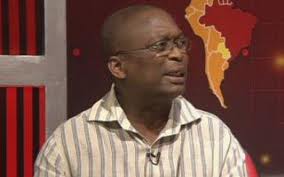 The Editor-in-chief of the New Crusading Guide, Mr Abdul Malik Kweku Baako, says he has a lot of experience when it comes to smoking marijuana popularly known as ‘wee’. The Editor-in-chief of the New Crusading Guide, Mr Abdul Malik Kweku Baako, says he has a lot of experience when it comes to smoking marijuana popularly known as ‘wee’.
Mr Baako said Saturday on News File, a news analysis programme on Accra-based Joy FM, that he started smoking marijuana in 1967 as 13-year-old, and smoked for 26 years before quitting the habit.
He emphasised the need to keep the drug away from the youth, saying from his experience “It’s not worth it.”
The Editor was reacting to calls by The Executive Director of NACOB, Mr Yaw Akrasi Sarpong, for a debate on the legalisation of marijuana in the country.
While Mr Baako implied that he was not in favour of a wholesale legalisation of marijuana, he agreed with fellow panelist on the programme, Mr Gabby Otchere-Darko, that the use, sale and possession of marijuana should be decriminalised.
He said it was no use sending people to prison for the use or sale of marijuana because there are thriving marijuana markets in prisons across the country.
NACOB boss, Mr Akrasi Sarpong, had last week stated that, a “virtual legalisation” of marijuana was already in place in the country.
Speaking to Accra-based Power FM, he said the drug is also smoked openly by many Ghanaians, including respected professionals.
He therefore called for a national debate on legalising marijuana in Ghana to enable proper regulation of the drug.
“People must not shy away from discussing the matter,” he said, adding that it was a headache the country must tackle.
The NACOB boss said proper regulation of marijuana will help stem abuse of the drug among the youth and help generate additional revenue for the state.
Earlier at the launch of the annual report of the International Narcotics Control Board (INCB) Mr Sarpong had expressed concern over the increasing use of marijuana in the Ghana.
According to him, the major illicit drug challenge facing the country was the cultivation, distribution and use of marijuana by school children and households.
He said the use of marijuana cut across all aspects of the Ghanaian society and had assumed such an alarming rate that it was being grown in many villages in the 10 regions.
In some cases, he said, farmers were planting cannabis instead of foodstuffs.
He named politicians, journalists, doctors, students, teachers, lawyers and children as part of the people who were involved in the use of the drug.
He said what was more disturbing was the fact that children as young as five or six years were sent by their teachers or adults to buy the drug for them, thereby putting them at great risk. |